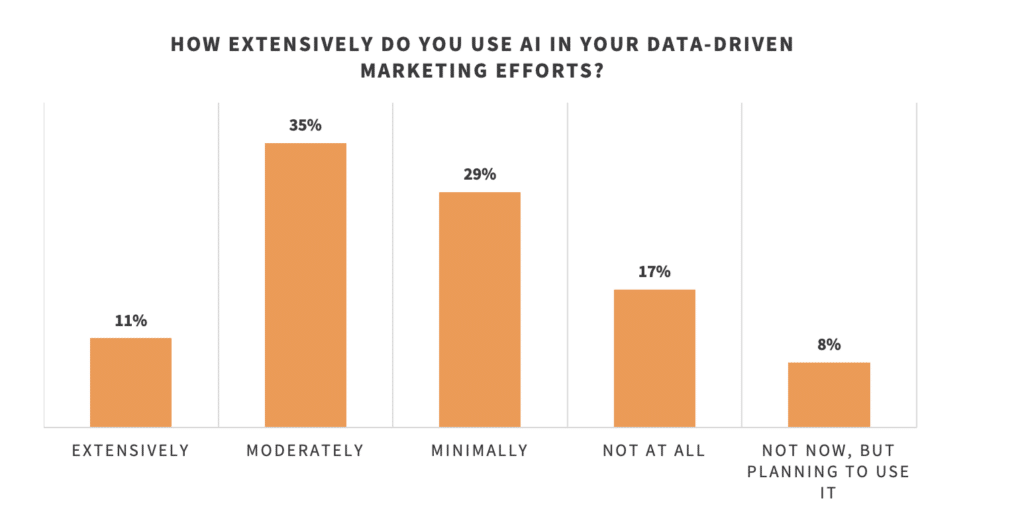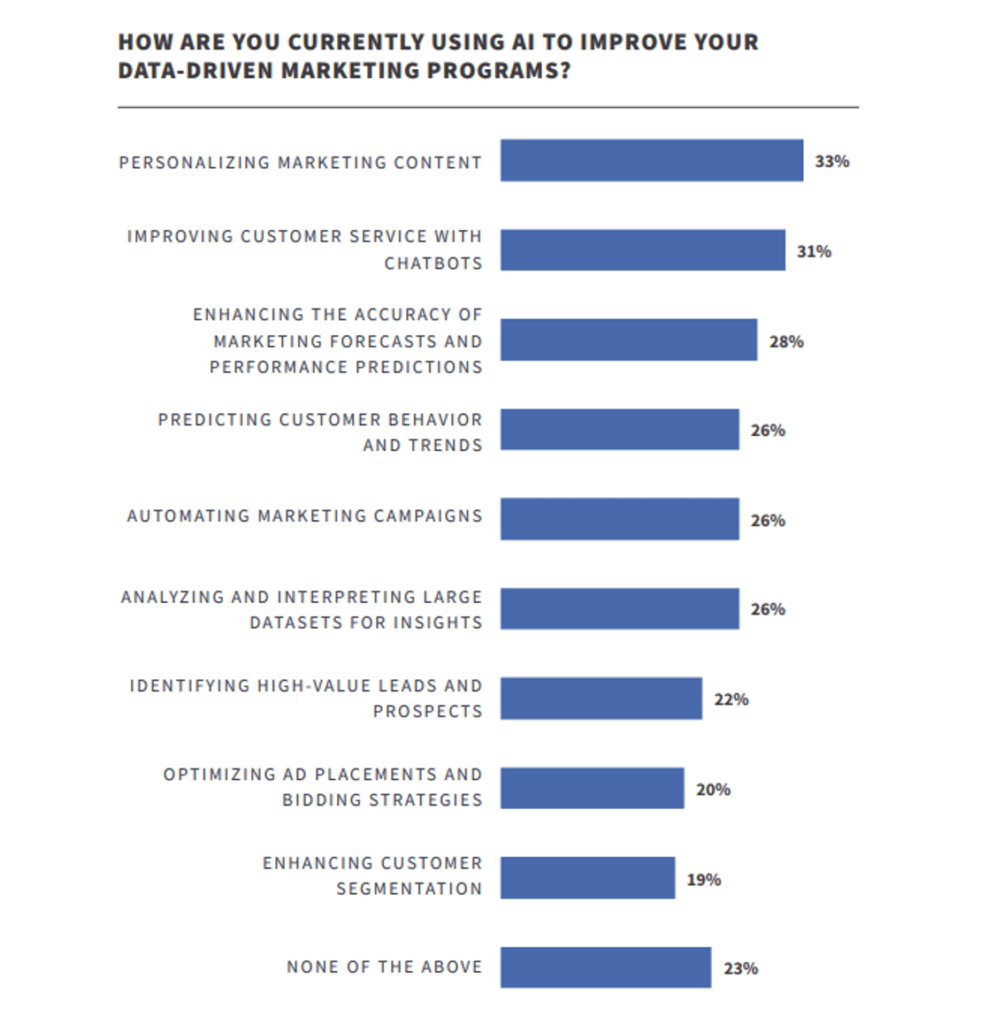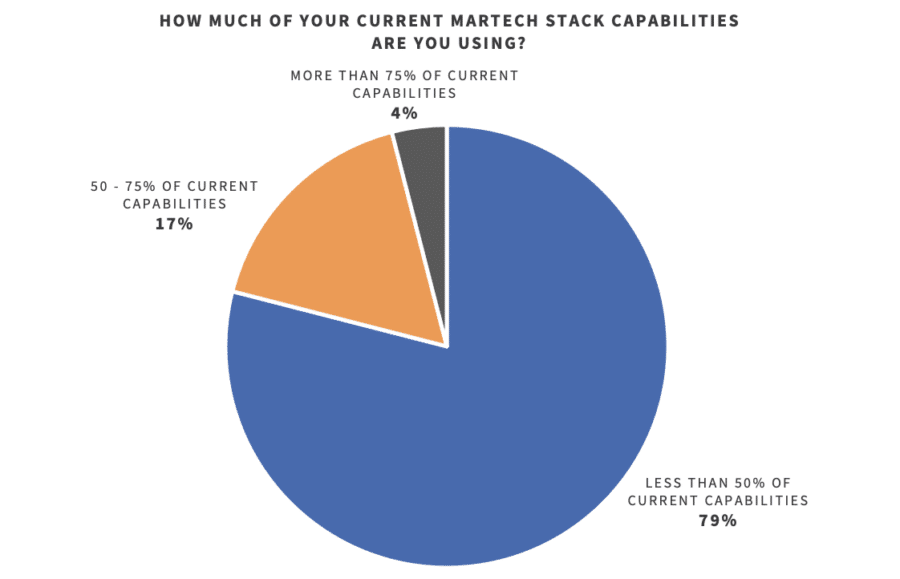“In the age of information, leveraging data is not just an advantage but a necessity for marketers looking to stay ahead of the competition and meet the evolving demands of their audience.” – Neil Patel, Digital Marketing Expert.
Data is the building block of successful marketing. Each year, marketing professionals become more focused on leveraging data to craft personalized and targeted campaigns that resonate with specific audience segments. You cannot stay ahead of the competition without a successful data-driven marketing strategy.
But what trends are impacting data-driven marketing?
Recently, Ascend2 and our Research Partners conducted the Data-Driven Marketing 2024 Survey (319 marketing professionals participated)and discovered some insightful data on the impact of AI in data-driven marketing strategies.
Download the 14-page Data-Driven Marketing Trends 2024 Survey Summary Report.
Here are some AI-focused findings and a few helpful tips on applying the research to specific areas of your data-driven marketing strategy.
Finding #1: Use of AI in Data-Driven Marketing is Growing
While only a small portion of respondents (11%) use AI extensively in their data-driven marketing efforts, a more significant segment (35%) is leveraging AI to a moderate extent, suggesting a growing but cautious adoption of AI technologies. Additionally, 29% are using AI minimally, and 17% are not using it at all, highlighting that there are still significant barriers or gaps in AI integration within many organizations.

Notably, 8% of respondents plan to adopt AI in the future, indicating an upward trend in AI utilization as businesses recognize its potential benefits and seek to enhance their marketing capabilities through advanced technologies. To capitalize on this trend, organizations should focus on educating their teams about AI benefits, investing in scalable AI solutions, and fostering a culture of innovation to stay competitive.
A helpful tip for marketing professionals looking to capitalize on the growing trend of AI adoption is to prioritize education and training within their teams. Ensuring that your marketing team understands the fundamentals of AI and its practical applications can significantly reduce the barriers to implementation. Host workshops, webinars, and training sessions to familiarize your team with AI tools and technologies. Additionally, it encourages experimentation and a culture of innovation by allowing team members to pilot AI-driven projects on a smaller scale before rolling out broader initiatives. Investing in your team’s knowledge and skills can facilitate a smoother transition to more extensive AI usage, ultimately enhancing your marketing efforts and staying ahead of the competition.
Finding #2: Use of AI in Data-Driven Programs
A significant portion of respondents (33%) are utilizing AI to personalize marketing content, which is the most common application of AI in improving data-driven marketing programs. Improving customer service with chatbots (31%) and enhancing the accuracy of marketing forecasts (28%) are also prominent uses, indicating that AI is being leveraged to refine customer interactions and predictive analytics. However, 23% of respondents are not using AI for any of these purposes, suggesting that while AI adoption is growing, a substantial group has yet to integrate AI into their marketing strategies.

To effectively use AI for personalized marketing content, leverage machine learning algorithms to analyze customer data and generate tailored recommendations and messaging that resonate with individual preferences and behaviors. AI can sift through vast amounts of data to identify patterns and insights that might not be immediately obvious, allowing marketers to craft relevant content. Additionally, AI can automate the process of content creation, personalization, and distribution, ensuring that each customer receives the most appropriate message at the optimal time.
Practical Tips for Marketing Professionals:
- Understand Your Data: Begin by collecting and organizing your customer data. This includes demographic information, purchase history, browsing behavior, and engagement metrics. Ensure that your data is clean and well-structured to facilitate accurate analysis by AI algorithms.
- Segment Your Audience: Use AI to segment your audience based on various criteria such as behavior, preferences, and demographics. This allows for more targeted and effective marketing campaigns.
- Develop Customer Personas: Create detailed customer personas using insights gained from AI analysis. These personas should reflect the distinct needs, preferences, and behaviors of different segments of your audience.
- Implement Predictive Analytics: Leverage predictive analytics to forecast future customer behaviors and trends. This helps anticipate customer needs and proactively address them with personalized content.
- Utilize Dynamic Content: Employ AI to create dynamic, personalized content based on user interactions. This could include personalized email subject lines, product recommendations, and tailored landing pages.
- A/B Testing: Continuously test different versions of your AI-driven content through A/B testing. This helps determine what resonates best with your audience and allows for the ongoing optimization of your content strategy.
- Monitor Performance Metrics: Keep a close eye on performance metrics such as engagement, conversion, and customer feedback. Use these metrics to refine and improve your AI-driven marketing strategies.
- Stay Updated with AI Advancements: AI technology is rapidly evolving. Stay informed about the latest advancements and trends in AI to ensure you are leveraging the most effective tools and techniques for your marketing efforts.
- Ensure Ethical Use of AI: Be transparent with your customers about how their data is used. Ensure your AI practices comply with data privacy regulations and maintain customer trust.
- Invest in AI Training: Equip your marketing team with the necessary skills to effectively use AI tools. Consider investing in training programs or hiring AI specialists to maximize the benefits of AI in your marketing strategy.
By implementing these practical tips, marketing professionals can harness the power of AI to create more personalized, effective, and engaging marketing content.

